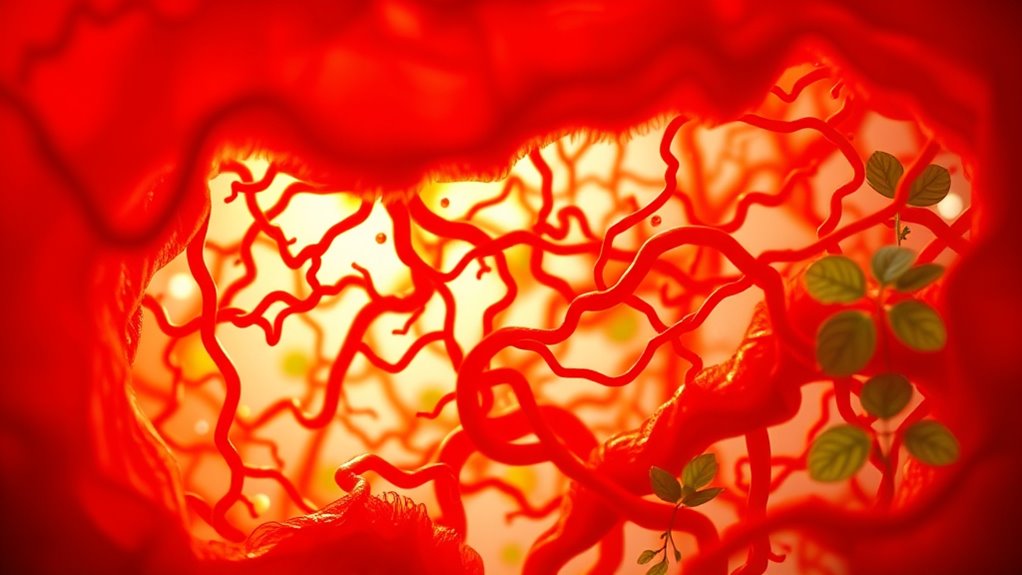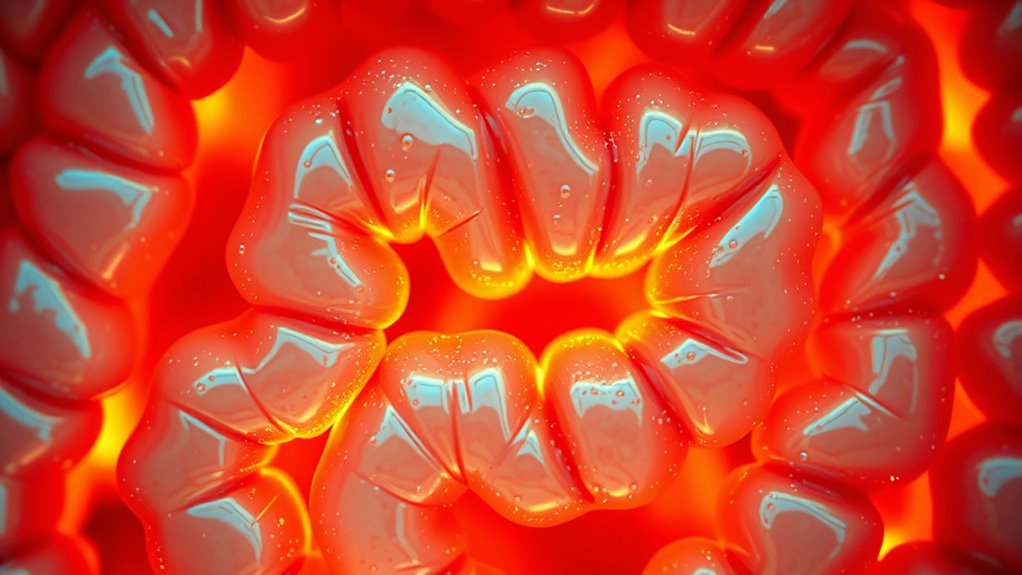Your gut’s second brain, called the enteric nervous system, controls digestion and communicates with your central nervous system to influence your overall health. To keep it happy, focus on eating probiotic-rich foods like yogurt and sauerkraut, and prebiotics such as garlic and bananas, which fuel good bacteria. Manage stress, get enough sleep, exercise regularly, and stay hydrated. For more tips on maintaining a healthy gut ecosystem, discover how your choices impact this crucial system.
Key Takeaways
- The gut’s enteric nervous system functions independently but communicates with the brain, influencing digestion and mental health.
- Maintain a diverse microbiome by eating probiotic and prebiotic foods to support gut health.
- Avoid processed foods, excess sugars, and antibiotics that can disrupt gut bacteria balance.
- Manage stress, get adequate sleep, and exercise regularly to promote a healthy gut ecosystem.
- Making informed dietary and lifestyle choices sustains your gut’s second brain for overall well-being.

Many people are unaware that your gut actually contains a complex network of neurons often called your “second brain.” This enteric nervous system operates independently of your brain and spinal cord, controlling digestion and communicating with your central nervous system. It’s a fascinating part of your body that plays a crucial role in your overall health. When your gut functions well, your digestive health improves, and you often feel better physically and mentally. A balanced gut is essential for absorbing nutrients, regulating immune responses, and supporting mental clarity.
Your gut’s second brain is an independent network vital for digestion and overall health.
One of the key elements in maintaining your gut’s health is nurturing your gut bacteria. These trillions of microorganisms reside mainly in your intestines and form a dynamic ecosystem that influences many bodily functions. When your gut bacteria are in harmony, they help break down food efficiently, produce vital vitamins, and keep harmful pathogens in check. An imbalance—called dysbiosis—can lead to digestive issues like bloating, constipation, or diarrhea, and even contribute to broader health problems such as inflammation or mood disorders. That’s why focusing on gut bacteria is fundamental for digestive health.
To keep your gut bacteria thriving, you should incorporate probiotic-rich foods into your diet. Yogurt, kefir, sauerkraut, and kimchi are excellent sources of beneficial bacteria that support a healthy microbiome. Prebiotics, like fiber-rich foods such as garlic, onions, bananas, and whole grains, serve as fuel for these good bacteria, helping them grow and function optimally. Avoiding excessive intake of processed foods, sugars, and antibiotics can also prevent the disruption of your gut’s microbial balance. When your gut bacteria are balanced, your digestion becomes smoother, and you’re less prone to discomfort and illness.
Additionally, managing stress and getting enough sleep are vital for your digestive health because stress can negatively impact your gut bacteria and overall gut function. Regular exercise can also promote a healthy microbiome, encouraging the diversity and resilience of your gut bacteria. Staying hydrated helps your digestive system move food and waste efficiently, preventing issues like constipation that can throw your gut out of balance.
In essence, caring for your gut bacteria is a key part of keeping your second brain happy and functioning properly. When you prioritize a diet rich in probiotics and prebiotics, and support your mental and physical well-being, you boost your digestive health and help your second brain operate at its best. Your gut, after all, is more than just digestion—it’s a vital hub influencing your overall health and happiness.
Moreover, understanding the importance of gut microbiome diversity can help you make informed choices to support your long-term health.
Frequently Asked Questions
Can Gut Health Affect Mental Health and Mood?
Gut health definitely impacts your mental health and mood through the gut-brain connection. When your microbiome diversity is high, it supports better communication between your gut and brain, helping regulate mood and reduce anxiety. If your microbiome is imbalanced, you might experience mood swings or stress. Prioritizing gut health with diverse, fiber-rich foods boosts microbiome diversity, which in turn promotes a happier, more balanced mental state.
How Does Stress Impact My Gut Microbiome?
Imagine your gut microbiome as a bustling city, disrupted when stress hits. You might not see it, but stress reduces your body’s stress reduction efforts, leading to an imbalance of gut bacteria. This imbalance can cause digestive issues and mood swings. To keep your gut happy, prioritize stress reduction techniques like meditation or exercise, which help maintain healthy gut bacteria and support your overall well-being.
Are Probiotics Effective for Improving My Second Brain?
You might wonder if probiotics are effective for improving your second brain. The answer is yes, but it depends on the probiotic strains you choose. Certain strains support digestive health by balancing your gut microbiome, which in turn can enhance mood and overall well-being. Consuming probiotics with specific strains tailored for digestive health can help keep your gut’s second brain happy and functioning at its best.
What Foods Harm My Gut’S Balance?
Did you know that over 70% of your immune system resides in your gut? Foods like processed snacks, excess sugar, and artificial sweeteners can harm your gut’s balance by disrupting your gut flora. Avoid these, and instead focus on fermented foods like yogurt or sauerkraut. They support healthy bacteria, helping keep your second brain happy and functioning at its best. Stay mindful of what you eat to protect your gut health.
How Long Does It Take to See Gut Health Improvements?
You might see digestive timelines vary, but typically, noticeable microbiome changes can take anywhere from a few days to a few weeks. When you focus on eating gut-friendly foods and avoiding irritants, your gut’s balance improves gradually. Consistency is key, so stick with your routine. Over time, these habits promote better digestion, reduced discomfort, and a healthier second brain, usually within 2 to 4 weeks of dedicated effort.
Conclusion
Think of your gut as a garden, where your second brain tends to the roots of your well-being. When you nourish it with healthy foods, it blooms with happiness, and your mind flourishes in return. Ignore its needs, and weeds of discomfort can take over. By caring for this silent partner, you’re planting seeds of balance that grow into a vibrant, joyful life. Remember, a happy gut is the heartbeat of your overall happiness.










